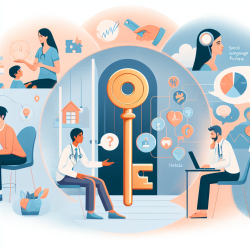Introduction
As a passionate advocate for children's mental health and a proponent of data-driven decisions, I am excited to explore the findings from the Indo-US Health Care Summit 2009, specifically the mental health section. This summit brought together experts from the US and India to discuss collaborative efforts in medical education, health care services, and research. The insights and objectives developed during this summit offer valuable guidance for practitioners looking to enhance their skills and improve outcomes for children.
Key Objectives from the Summit
The summit identified several key objectives that can guide practitioners in their work:
- Leadership and Public Education: Emphasize that major depression is a brain disorder, treatable, and that timely treatment can prevent disability and suicide. Practitioners should engage with like-minded organizations to disseminate this core message.
- Medical Education: Strengthen psychiatric education by establishing relations between institutions, utilizing tele-psychiatry and online courses, and developing core curricula for medical branches.
- Reducing Complications of Depression: Focus on decriminalizing attempted suicide, improving reporting systems, and conducting pilot studies on risk and interventions in vulnerable groups.
- Integrating Mental Health Treatment & Primary Health Care: Train general practitioners in psychiatry using modified long-distance learning modules suitable for the Indian context.
Practical Implementation for Practitioners
Practitioners can leverage these objectives to improve their practice and outcomes for children. Here are some practical steps:
- Engage in Continuous Education: Participate in online courses and tele-psychiatry sessions to stay updated on the latest practices and research in mental health.
- Collaborate with Organizations: Partner with like-minded agencies to promote mental health education and awareness. This collaboration can amplify the reach and impact of mental health initiatives.
- Focus on Early Intervention: Implement screening tools and early intervention strategies in schools to identify and support children at risk of mental health issues.
- Advocate for Policy Changes: Support efforts to decriminalize attempted suicide and improve national reporting systems for mental health issues. These changes can facilitate better data collection and targeted interventions.
Encouraging Further Research
The summit highlights the importance of ongoing research to address mental health challenges. Practitioners are encouraged to contribute to this effort by:
- Conducting Pilot Studies: Engage in research to explore effective interventions for vulnerable groups, such as children in schools or rural communities.
- Sharing Findings: Publish research findings and case studies to contribute to the broader understanding of mental health issues and effective treatments.
- Participating in Collaborative Research: Join forces with academic institutions and organizations to conduct large-scale studies that can inform policy and practice.
Conclusion
The Indo-US Health Care Summit 2009 provides a comprehensive framework for improving mental health outcomes through education, collaboration, and research. By implementing these objectives and engaging in further research, practitioners can make a significant impact on the mental health of children and contribute to a healthier future.
To read the original research paper, please follow this link: Report of the Indo-US Health Care Summit 2009 - Mental Health Section.










